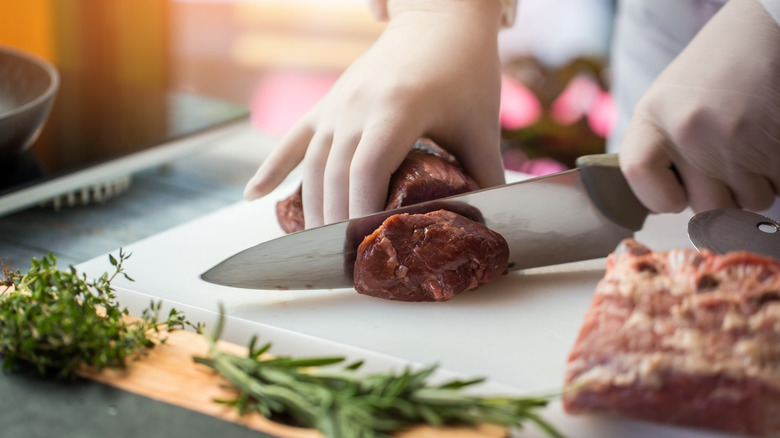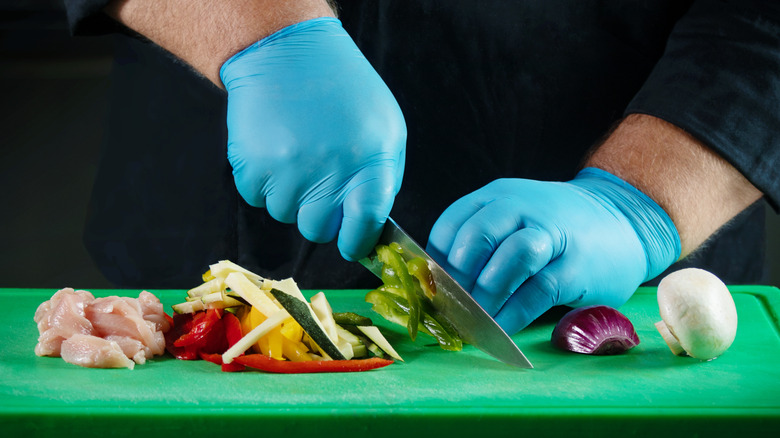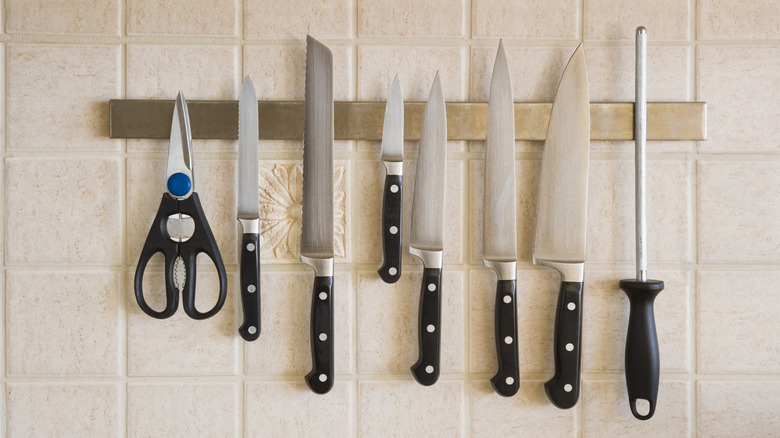The Best Type Of Cutting Board To Keep Your Knives Sharp
While it might sound counterintuitive, keeping your knife blades sharp is one of the most vital tips for kitchen safety. Duller cutting utensils require more force to cut with, which increases the chances of them sliding around while you try to slice food. They could even flip over or go flying if you press your hand down too hard — can you say ER? This is why cooks who are wary of sharp objects should actually do their best to keep their knives in top condition. Sharpening often is a good start, but it's even better to minimize the chances of the blades dulling from everyday use.
Replacing your cutting board is a great place to start, and if you're in the market for a new one, pick a model made of rubber. These boards are not as popular as wooden or plastic versions, but they have much softer surfaces that won't chip or dull knives as much. And unlike wood, rubber is impermeable and therefore doesn't hold onto bacteria from raw meat or other potentially hazardous foods. You'll still have to clean your boards off after cutting meat, to avoid cross-contamination, but they can be used for any ingredient and don't require a painstaking washing process.
Many professional chefs use rubber cutting boards for these reasons. They're more expensive than plastic and wooden products, but will save you money in total, since you won't have to frequently replace your knives or get them sharpened at your grocery store.
Always use your cutting board, for your knives' sakes
Buying a rubber cutting board is a good move to treat your knives better, but you have to actually make use of the board whenever possible. Many of us have been tempted to chop food directly on the kitchen counter, perhaps with a paper towel underneath. Some days, it just feels like too big a hassle to clean and take out a cutting board, which might slide all over your smooth counters. However, you may be surprised to learn that your counter is probably harder than your knives, even the expensive ones.
Most high-quality knives clock in at around 60 HRC on the Rockwell Hardness Scale, which measures the durability of materials. If your kitchen counters and surfaces are made of granite, marble, glass, or ceramic, they're harder than your knives and will dull your blade upon contact. Wooden or bamboo surfaces might not damage your knives as much, but your knives will almost certainly damage them.
Why risk harming your knives or your kitchen itself, when you have a rubber cutting board on hand? Rubber cutting boards are much softer in comparison to the metal most knives are made of, and their "grippy" material makes them highly unlikely to slide around. There's much less risk of your cutting board, knife, or food slipping around, making for a win-win-win.
Other tips to keep your cutting board and knives at their best
Rubber cutting boards don't require much upkeep after purchase. Unlike plastic, rubber models will not develop "scarring" or grooves from knife use over time. Such grooves make it harder to clean off the harmful microbes on your cutting board, posing a health hazard every time you use it to prep raw ingredients. And unlike wood, rubber does not need frequent rubs with oil to prevent splitting. Rubber cutting boards can develop small cuts over time, but you can easily rub them off with sandpaper.
Knives require much more care, by comparison. While many kitchen blades are able to handle the heat of a dishwasher, their sharpness will often be compromised by the rough movements of a cleaning cycle. Most professional cooks recommend washing knives by hand, as it allows you to gently remove any gunk.
Storage also plays a crucial role in the upkeep of knives, as you never want to put them in places where their blades get jostled by other metal tools or tough surfaces. Generally speaking, your kitchen drawers are not the best idea. Your knives can not only get bumped by other utensils and the walls of the drawer, but the blades can slide around and injure you. An wall-hanging magnetic knife board can easily fix this issue, but if you must place them inside a drawer, store your best knives in newspaper or in a sheath to protect them.



